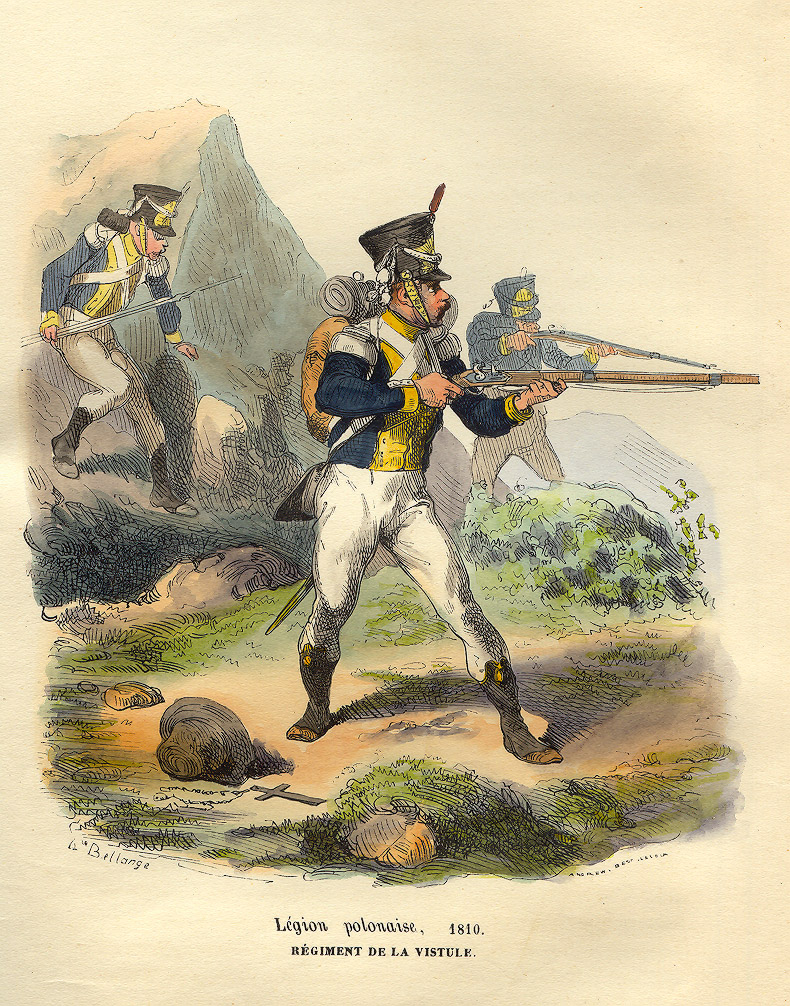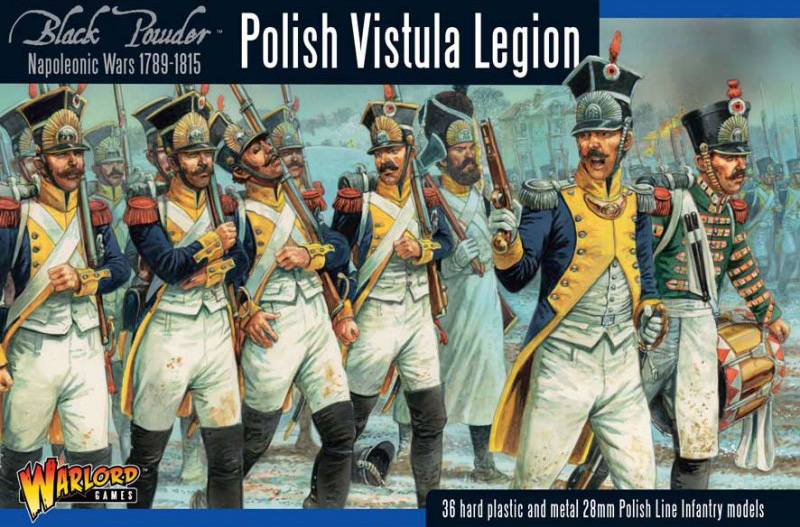
Пин на доске Polish and Vistula Legion Army Nap Wars
The Vistula Legion were one of the most famous units that fought for the French during the Napoleonic era. They ran down British and Russian troops in various conflicts over the years. An interesting fact is that the Vistula Legions didn't take banners for most of their life time until they were re-organised in late 1813.
Boxart 120mm Polish Vistula Legion Miniatures
Polish Vistula Legion Infantryman. The Melee. In many of Rocco's battle tableaux, one is reminded of other great military artists who went before him. His painting of a house at Mockern in 1813, showing Prussian infantrymen firing through the door and window, immediately brings to mind De Neuville's well-known Franco-Prussian War piece.

Vistula Legion Infantry Polish 1st Regiment Soldier Napoleonic
But the Polish Legion, numbering barely 20,000 men, was merely a pest in the path of the 200,000-man "Army of the West" that the Communists were readying to unleash.. The defenders of Warsaw charged across the Vistula and joined Piłsudski's men, turning the battle into a rout. On August 18 a staggered Tukhachevsky ordered a retreat.

Vistula Legion infantry [Poland] Napoleonic wars, Napoleon, Army uniform
Polish Vistula Legion Hannoverian Legion Portuguese Legion Irish Legion etc. forces of allied or dependent states. Westphalian Corps in 1812 Bavarian Corps in 1812 Saxon Corps etc. List of French light regiments formed of foreigners: In 1811-1813 in the ranks of 8th Regiment of Light Infantry served many Croats.

Polish Vistula Legion in Spain Napoleonic wars, Revolutionary war
The Legion of the Vistula (Polish language: Legia Nadwiślańska ) was a unit of Poles in the service of Napoleonic France, one of the larger Polish legions of the Napoleonic period . Contents 1 Creation of the Legion 2 Service in Spain 3 Service in Russia 4 Service in Germany 1813 5 Service in France 1814 6 See also 7 External links

Battleground Hobbies Napoleonic Polish Vistula Legion New Release
The V stula Lancers Regiment. This prestigious body of light cavalry was made up of about 1000 men, all of Polish nationality, distributed in four squadrons of two companies, commanded by Colonel J. Konopka. Although the name of Vistula Legion was given to them by the Emperor on the 2nd March 1808, in fact its origins went back to the 8th September 1799 when it was created as the "Regiment of.

The Analogue Hobbies Painting Challenge From DaveX Polish Vistula
Polish Troops of Napoleonic Wars : Strength : Organization : Campaigns : Legions . When it comes to Poles of the Napoleonic era, consider how hard a proud people fight when they have no homeland of their own, and they feel that following one man, Napoleon, is their best chance to get one. . The Poles were "Napoleon's staunchest allies"

Battleground Hobbies Napoleonic Polish Vistula Legion New Release
When recounting the history of the Polish Legions, some works also describe the operations of Polish units under the French in the period after 1803; several smaller formations existed in that time, the most notable of which was the Vistula Legion, which existed between 1808 and 1813. [6]

Left Handed Panzerfaust Warlord Games 28mm Polish Vistula Legion Review
The Legion of the Vistula ( Polish: Legia Nadwiślańska) was a unit of Poles in the service of Napoleonic France, one of the larger Polish legions of the Napoleonic period . Creation of the Legion

Battleground Hobbies Napoleonic Polish Vistula Legion New Release
In November, 1807, the Legion Polacco-Italienne was transferred to the service of King Jerome-Napoleon's new Kingdom of Westphalia, but in March, 1808, it was recalled to French service and renamed the Legion de la Vistula. It was to be formed of three infantry regiments, each of two battalions, each battalion having six companies of 140 men.

Vistula legion Uniformes militares, Guerras napoleónicas, Historia
The Polish Legions ( Polish: Legiony Polskie we Włoszech; also known as the Dąbrowski Legions) were several Polish military units that served with the French Army in the Napoleonic era, mainly from 1797 to 1803, although some units continued to serve until 1815. Jan Henryk Dąbrowski, the most famous commander of the Polish Legions.

101 best images about Polish and Vistula Legion Army Nap Wars on
the Vistula Legion in Spain and Russia, and finishes with a look at the Polish units in the Imperial Guard. The majority of The Polish Legions (150 pages) examines in detail the organization and uniforms of the various units that formed Napoleon's Polish Legions. These include . The Polish Legions in Italy 1797-1799 . The Danube Légion 1799-1802

Left Handed Panzerfaust Polish Vistula Legion Part 2
Polish Units - Napoleonic Era. Following the victories at Austerlitz (1805) and later Jena and Auerstädt (1806), Napoleon called on Poles to establish a "Northern Legion" (also known as the Vistula Legion and, originally, the Légion Polacco-Italienne of the newly created Westphalian Army), yet without mentioning "Poland" in the name.

Polish Vistula Legion by G Rava History war, Military illustration
The Legion and its Lancer Regiment went to Metz and Bayonne, where they and detachments from all other Poles in French service, began organizing the Vistula Legion by the end of May 1808. Later, the Vistula Legion organized its depot in Sedan. The lancer regiment was organized like a French chasseur-a-cheval regiment."

Vistula legion Wargaming, Miniature gaming, Napoleonic wars
The Legion of the Vistula ( Polish: Legia Nadwiślańska) was a unit of Poles in the service of Napoleonic France, one of the larger Polish legions of the Napoleonic period. 'Vistula Legion' Polish infantry Oops something went wrong: 403

Vistula Legion Infantry Polish Pioneer 1st Regiment Soldier Napoleonic
The Battle of Los Yébenes (24 March 1809) was the clash of the Regiment of Polish Lancers of the Legion of the Vistula with multiple regiments of Spanish cavalry, near the Spanish village (today municipality) of Los Yébenes. The heavily outnumbered Polish regiment, led by Colonel Jan Konopka, was attacked by surprise and almost defeated by the larger Spanish force.